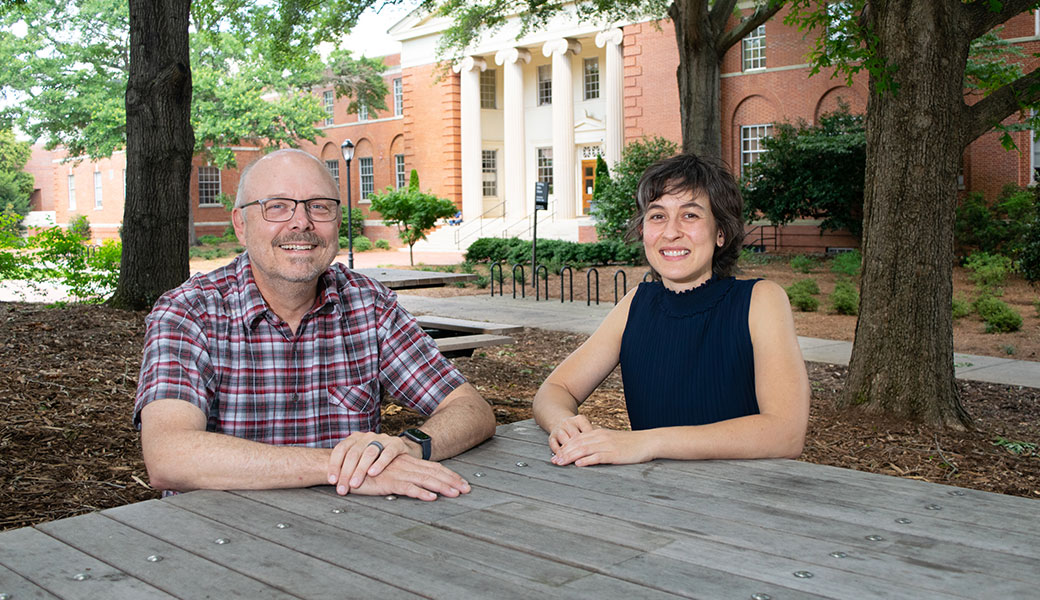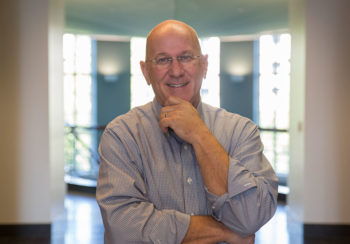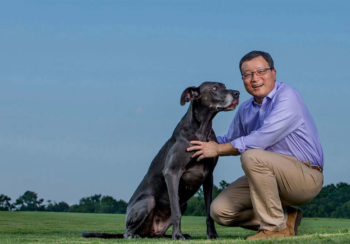David Peterson and Liliana Salvador have a new appreciation for the interview skills of Terry Gross, host of National Public Radio’s “Fresh Air.” That’s because the two scientists are dipping their toes into Gross’ world by hosting a new podcast from the University of Georgia.
“People, Parasites and Plagues” takes advantage of UGA’s research strengths in infectious diseases and related disciplines to provide listeners with well-sourced conversations on scientific topics.
The podcast debuted in April with a discussion of influenza featuring S. Mark Tompkins, professor of infectious diseases in the College of Veterinary Medicine. Tompkins is leading a UGA contract to establish the Center for Influenza Disease and Emergence Research, a multi-institutional center funded with up to $92 million from the National Institutes of Health, where scientists will work to increase understanding of influenza virus emergence and infection in humans and animals while also preparing to combat future outbreaks or pandemics.
With Tompkins as the inaugural guest, topics on the first episode of “People, Parasites and Plagues” ranged from the 1918 influenza pandemic to flu vaccines to how the COVID-19 pandemic will affect this year’s flu season.
“It was fun, because we could have a good talk about scientific concepts, but keep it at a more basic level,” Tompkins said. “UGA has land-grant and sea-grant missions and an extension service that’s well recognized. Our research programs may not directly impact someone at the local level, but talking about them shares knowledge—another of the university’s missions—as well as engaging the community and inspiring the next generation of scientists.”
The podcast is the brainchild of Don Harn, director of UGA’s Faculty of Infectious Diseases, who was looking for a way to market UGA’s strengths.
“There’s a lot of great talent here,” said Harn, professor of infectious diseases in the College of Veterinary Medicine and Georgia Research Alliance Distinguished Investigator. “There’s a collection of world-class scientists in a variety of disciplines, including very strong groups at the Center for Tropical and Emerging Global Diseases and the Center for Vaccines and Immunology.”
Tompkins’ CIDER contract is UGA’s second major NIH award for flu research in less than two years. In September 2019, UGA received a contract worth up to $130 million to establish one of several Collaborative Influenza Vaccine Innovation Centers across the country. Led by Ted M. Ross, Georgia Research Alliance Eminent Scholar of Infectious Diseases in the College of Veterinary Medicine and director of the Center for Vaccines and Immunology, the center is working to develop a “universal” flu vaccine that would be effective against any strain of the influenza virus that can infect humans.
Tompkins, Ross and many fellow UGA virologists and immunologists are part of UGA’s College of Veterinary Medicine, which is an asset in studying zoonotic diseases that spread between animals and humans. The vet med researchers are complemented by computational biologists and bioinformaticists in the Odum School of Ecology and the Franklin College of Arts and Sciences, by epidemiologists in the College of Public Health, and by public health communication experts in the Grady College of Journalism and Mass Communication, in addition to researchers at the Center for the Ecology of Infectious Diseases and scientists in other related fields around the university.

UGA is also home to a state-of-the-art biocontainment facility necessary to study live virus as well as the Complex Carbohydrate Research Center, a world leader in studying the complex sugars used by many viruses—including both flu and SARS-CoV-2—to bind to their hosts.
In addition to demonstrating UGA’s expertise in a media forum that can reach scientific peers, Harn wants to reach a more general audience.
“The ultimate goal, besides our peers, would be to get the general public to listen,” he said. “I know that there’s a lot of skepticism about science among the general population, but as these podcasts continue, I hope they learn that they can trust the scientists at UGA and what they have to say.”
Hosts Peterson and Salvador share that goal.
“I teach a science communications course, so I’m always mindful of communication,” said Peterson, associate professor of infectious diseases and faculty in the Center for Tropical and Emerging Global Diseases. “Of course, being mindful is one thing, but putting it into practice is another.”
In September 2019, Peterson spoke on malaria at a meeting of the Athens Science Café, an organization established in 2014 to connect the Athens community with science by facilitating a two-way dialogue between scientists and citizens.
“I really like science communication, and I love the work I do,” said Salvador, assistant professor with an appointment in the Department of Infectious Diseases and the Institute of Bioinformatics. “I want people to understand what we do and to find ways of communicating that to make science more approachable.”
With five episodes produced—and more than 350 downloads—the team is hitting its stride. Harn, Peterson and Salvador rely on producer Dariel Stanford, a master’s student at the Grady College, to conduct research, assist with writing questions, and turn the recordings into a polished, tightly edited 20-to-30-minute show. (Stanford’s position is supported by the Grady College, College of Veterinary Medicine and Office of Research.) Sabriya Rice, the Knight Chair in Health and Medical Journalism at the Grady College, provides crucial input that guides how the hosts approach topics and interviews.
Though the podcast centers around UGA’s strengths in infectious disease research, guests won’t be limited to experts in infectious diseases or even to experts at UGA.
“We want to try to keep close to people, parasites and plagues, but there’s a lot of really great stuff going on here,” Harn said. “There are great people in marine biology, fantastic people in ecology, there are fantastic people at the College of Agricultural and Environmental Sciences, just to name a few.”
Topics covered so far include coronavirus vaccines in chickens, brain-eating amoeba, and developing new drugs to fight malaria. In episode three, Peterson and Salvador found themselves interviewing journalist Janice Hume about media coverage of pandemics.
“I thought it kind of hilarious that they were interviewing me about influenza. That was surreal. I don’t know anything about the flu,” said Hume, professor and journalism department head, who also holds the Carter Chair in Journalism Excellence. “Of course, they were interested in how the press covered the 1918 pandemic, and I could speak on that. David and Liliana offer expert perspective that’s valuable and credible.”
And the hosts are looking forward to discussing a variety of topics.
“UGA is tremendously strong across a lot of different genres of infectious disease research, particularly in parasitology and influenza and vaccine research,” Peterson said. “We have the Center for Tropical and Emerging Global Diseases, and we have the Center for Drug Discovery, and they do a lot with antimicrobials.”
“For disease ecology, there are a handful of universities where the best are, and UGA definitely is one of them,” Salvador said. “Georgia is a big hub of infectious diseases research because of the CDC, because of Emory, because of UGA. When I applied to the university, I had never been to Georgia, but I knew UGA. I knew the reputation UGA had in the field of ecology and evolution of infectious diseases.”
In addition to bringing in guests with expertise, Harn wants to find guests that will have fun with the podcast and be able to have a good conversation—traits that will make for a good show. Early in his career, he was asked by PBS to film a segment for TV.
“You learn really quickly that scientists are not communicators to the public,” he said. “Every time I’d open my mouth and say something, the director would say, ‘No, you can’t say that.’ Most scientists don’t do a good job of communicating what it is they’re looking at and what the benefit is to humanity.”
“People, Parasites and Plagues” may change that—one podcast at a time.






